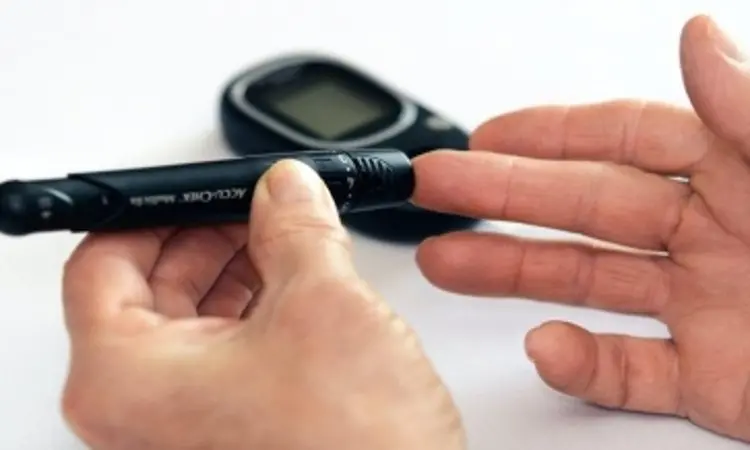- Home
- Medical news & Guidelines
- Anesthesiology
- Cardiology and CTVS
- Critical Care
- Dentistry
- Dermatology
- Diabetes and Endocrinology
- ENT
- Gastroenterology
- Medicine
- Nephrology
- Neurology
- Obstretics-Gynaecology
- Oncology
- Ophthalmology
- Orthopaedics
- Pediatrics-Neonatology
- Psychiatry
- Pulmonology
- Radiology
- Surgery
- Urology
- Laboratory Medicine
- Diet
- Nursing
- Paramedical
- Physiotherapy
- Health news
- Fact Check
- Bone Health Fact Check
- Brain Health Fact Check
- Cancer Related Fact Check
- Child Care Fact Check
- Dental and oral health fact check
- Diabetes and metabolic health fact check
- Diet and Nutrition Fact Check
- Eye and ENT Care Fact Check
- Fitness fact check
- Gut health fact check
- Heart health fact check
- Kidney health fact check
- Medical education fact check
- Men's health fact check
- Respiratory fact check
- Skin and hair care fact check
- Vaccine and Immunization fact check
- Women's health fact check
- AYUSH
- State News
- Andaman and Nicobar Islands
- Andhra Pradesh
- Arunachal Pradesh
- Assam
- Bihar
- Chandigarh
- Chattisgarh
- Dadra and Nagar Haveli
- Daman and Diu
- Delhi
- Goa
- Gujarat
- Haryana
- Himachal Pradesh
- Jammu & Kashmir
- Jharkhand
- Karnataka
- Kerala
- Ladakh
- Lakshadweep
- Madhya Pradesh
- Maharashtra
- Manipur
- Meghalaya
- Mizoram
- Nagaland
- Odisha
- Puducherry
- Punjab
- Rajasthan
- Sikkim
- Tamil Nadu
- Telangana
- Tripura
- Uttar Pradesh
- Uttrakhand
- West Bengal
- Medical Education
- Industry
Soup and Shake Diet Intervention Effective in Attaining Type 2 Diabetes Remission , claims Lancet study

A new study published in The Lancet Diabetes & Endocrinology journal suggests that through at-scale service delivery, type 2 diabetes can be remitted outside of research settings. Total diet replacement (TDR) has been found in randomized controlled studies to be effective in type 2 diabetes remission. The NHS Type 2 Diabetes Path to Remission (T2DR) program, a 12-month behavioral intervention to support weight loss that involves an initial 3-month period of TDR, was developed in response to the English National Health Service's (NHS) 2019 commitment to establishing a TDR-based interventional program delivered at scale within real-world environments. Thus, this study by Jonathan Valabhji and colleagues evaluated program participants of type 2 diabetes remission.
As part of a nationwide prospective service assessment the people in England between the ages of 18 and 65 who had been diagnosed with type 2 diabetes within the previous 6 years. The National Diabetes Audit and program data were connected to determine HbA1c values and prescriptions for medications that decrease blood sugar. Remission of type 2 diabetes at 1 year was the main outcome, which was outlined as two HbA1c measurements of less than 48 mmol/mol reported at least 3 months apart and no prescription for glucose-lowering drugs starting 3 months prior to the first HbA1c measurement and the second HbA1c measurement recorded 11 to 15 months after the start of program.
A total of 7540 participants were referred to the program between September 1, 2020, and December 31, 2022. Of which, 1740 began TDR prior to January 2022, giving them a full year to complete the program by the time data extraction took place at the end of December 2022. 960 people (55%) of the participants who began TDR prior to January 2022, finished the program.
There was an average weight reduction of 8·3% or 9·4 kg for the 1710 individuals who began the program before January 2022 and had no missing data, and an average weight loss of 9·3% or 10·3 kg for the 945 participants who finished the program and had no missing data. In a subset of 710 (42%) of 1710 patients who began the treatment before January 2022 and had two HbA1c measures recorded, 190 (27%) experienced remission, with a mean weight reduction of 13·4% or 14·8 kg. Of the 945 patients who finished the program, 450 (48%) had two HbA1c values recorded. 145 (32%) experienced remission, with a mean weight reduction of 14·4% or 15·9 kg.
Source:
Valabhji, J., Gorton, T., Barron, E., Safazadeh, S., Earnshaw, F., Helm, C., Virr, M., Kernan, J., Crowe, S., Aveyard, P., Wilding, J., Willis, T., Ells, L., O’Neill, S., Robertson, E., Jebb, S., Taylor, R., & Bakhai, C. (2024). Early findings from the NHS Type 2 Diabetes Path to Remission Programme: a prospective evaluation of real-world implementation. In The Lancet Diabetes & Endocrinology. Elsevier BV. https://doi.org/10.1016/s2213-8587(24)00194-3
Neuroscience Masters graduate
Jacinthlyn Sylvia, a Neuroscience Master's graduate from Chennai has worked extensively in deciphering the neurobiology of cognition and motor control in aging. She also has spread-out exposure to Neurosurgery from her Bachelor’s. She is currently involved in active Neuro-Oncology research. She is an upcoming neuroscientist with a fiery passion for writing. Her news cover at Medical Dialogues feature recent discoveries and updates from the healthcare and biomedical research fields. She can be reached at editorial@medicaldialogues.in
Dr Kamal Kant Kohli-MBBS, DTCD- a chest specialist with more than 30 years of practice and a flair for writing clinical articles, Dr Kamal Kant Kohli joined Medical Dialogues as a Chief Editor of Medical News. Besides writing articles, as an editor, he proofreads and verifies all the medical content published on Medical Dialogues including those coming from journals, studies,medical conferences,guidelines etc. Email: drkohli@medicaldialogues.in. Contact no. 011-43720751


